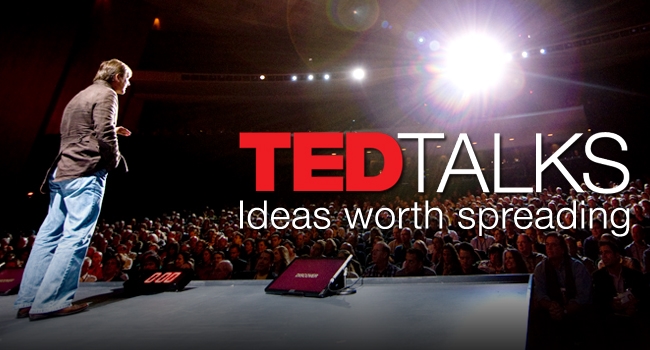In 2015, most actors are regular Internauts browsing online for research purposes, looking for casting breakdowns, acting tips, advice, inspiration and other good material. Some of you are probably familiar with TED talks. I’m a big fan of these speeches, so I decided to put together a list of the best TED talks for actors that you might find helpful.
Previously, we have published a list of motivational videos for actors that got a lot of positive response. Budding artists are ambitious people, and anything that fuels our desire to continue the struggle and eventually succeed in life will gain our attention.
For the uninitiated, TED talks are short videos (9-18 minutes) from intelligent and engaging speakers on a wide variety of topics. TED stands for Technology, Entertainment and Design, but in the last few years, the concept has expanded way beyond its original idea.
TED had speakers of the caliber such as Stephen Hawking, Bill Gates and Bono, but I’m not going to focus on these guys today. This list is not about the best TED speeches; it’s about best TED talks for actors and artists.
25 Best TED Talks for Actors
TED talks for actors below are primarily focused on the subjects that artists are always interested in: expanding imagination, sharpening creativity skills, embracing childish playfulness and continuing the pursuit of your dream career in a competitive field.
Some of you might have already seen one, two or all of these speeches. Nonetheless, it behooves actors to watch them over and over again and let the information truly sink in.
Brené Brown: The power of vulnerability
Brené Brown studies human connection — our ability to empathize, belong, love. In a poignant, funny talk, she shares a deep insight from her research, one that sent her on a personal quest to know herself as well as to understand humanity. A talk to share.
Amy Purdy: Living beyond limits
When she was 19, Amy Purdy lost both her legs below the knee. And now … she’s a pro snowboarder. In this powerful talk, she shows us how to draw inspiration from life’s obstacles.
Amanda Palmer: The art of asking
Don’t make people pay for music, says Amanda Palmer: Let them. In a passionate talk that begins in her days as a street performer (drop a dollar in the hat for the Eight-Foot Bride!), she examines the new relationship between artist and fan.
Elizabeth Gilbert: Your elusive creative genius
Elizabeth Gilbert muses on the impossible things we expect from artists and geniuses — and shares the radical idea that, instead of the rare person “being” a genius, all of us “have” a genius. It’s a funny, personal and surprisingly moving talk.
Sir Ken Robinson: Do schools kill creativity?
Sir Ken Robinson makes an entertaining and profoundly moving case for creating an education system that nurtures (rather than undermines) creativity.
Stew: Black Men Ski
What happens when a black man visits Aspen? Singer/songwriter Stew and his band are about to let you know.
Stephen Lang: The Architecture of Acting
Stephen Lang will speak about the creative evolution of Beyond Glory, a solo play that he began working on in 2003 and has performed more than 300 times. At heart, the play is a meditation on themes of courage, honor, fortitude, and humility. In his fifth decade as a professional actor, Beyond Glory represents Lang’s most personally meaningful work. In “The Architecture of Acting,” he will attempt to explain why in 18 minutes.
John Wright: Rediscovering playfulness in acting
Picasso maintained that it took him most of his adult life to rediscover how to draw like a child, the same challenge is there for an actor. An actor has to rediscover how to play like a child. Learning how to interpret the text as a responsible adult isn’t enough. As a director and teacher of acting, I have always been inspired by this quest for playfulness.
Ben Cameron: The true power of the performing arts
Arts administrator and live-theater fan Ben Cameron looks at the state of the live arts — asking: How can the magic of live theater, live music, live dance compete with the always-on Internet? In his talk, he offers a bold look forward.
David Kelley: How to build your creative confidence
Is your school or workplace divided into “creatives” versus practical people? Yet surely, David Kelley suggests, creativity is not the domain of only a chosen few. Telling stories from his legendary design career and his own life, he offers ways to build the confidence to create.
Charlie Todd: The shared experience of absurdity
Charlie Todd causes bizarre, hilarious, and unexpected public scenes: Seventy synchronized dancers in storefront windows, “ghostbusters” running through the New York Public Library, and the annual no-pants subway ride. In his talk, he shows how his group, Improv Everywhere, uses these scenes to bring people together.
Patsy Rodenburg: Why I do Theatre
Patsy Rodenburg says the world needs actors more than ever. In this talk at Michael Howard Studios, she tells the story of a profound encounter that reveals the deeper role theater can play in people’s lives.
Thandie Newton: Embracing otherness, embracing myself
Actor Thandie Newton tells the story of finding her “otherness” — first, as a child growing up in two distinct cultures, and then as an actor playing with many different selves.
Eduardo Briceno: The Power of belief – Mindset and success
The way we understand our intelligence and abilities deeply impacts our success. Based on social science research and real life examples, Eduardo Briceño articulates how mindset, or the understanding of intelligence and abilities, is key. When students or adults see their abilities as fixed, whether they think they’re naturals or just not built for a certain domain, they avoid challenge and lose interest when things get hard.
Tim Brown: Tales of creativity and play
At the 2008 Serious Play conference, designer Tim Brown talks about the powerful relationship between creative thinking and play — with many examples you can try at home (and one that maybe you shouldn’t).
Brené Brown: The price of invulnerability
In our anxious world, we often protect ourselves by closing off parts of our lives that leave us feeling most vulnerable. Yet invulnerability has a price. When we knowingly or unknowingly numb ourselves to what we sense threatens us, we sacrifice an essential tool for navigating uncertain times — joy. This talk will explore how and why fear and collective scarcity has profoundly dangerous consequences on how we live, love, parent, work and engage in relationships — and how simple acts can restore our sense of purpose and meaning.
Tina Seelig: A crash course in creativity
These words describe the visionaries we all respect and admire. And they can describe you, too. Contrary to common belief, creativity is not a gift some of us are born with. It is a skill that all of us can learn. International bestselling author and award-winning Stanford University educator Tina Seelig has worked with some of the business world’s best and brightest, who are now among the decision-makers at companies such as Google, Genentech, IBM, and Cisco.
Magnus Walker: Go with your gut feeling
Magnus Walker talks about his life journey of following his passion and going with his gut feeling which eventually led him to turning his dreams into his reality.
Michael Litt: Why you have to fail to have a great career
Some people start their careers slowly, while others start with a bang. Michael Litt’s case is definitely the latter: the serial entrepreneur’s first venture comprising the import and re-sale of firecrackers to his fifth-grade classmates. But if the story were to be told from beginning to end, Litt would be the first to admit that his path has actually involved a number of “bangs” — including some which didn’t quite work out in his favour — a fair number of nervous moments, and lot of plain, old-fashioned hard work.
Larry Lessig: Laws that choke creativity
Lawrence Lessig, the Net’s most celebrated lawyer, cites John Philip Sousa, celestial copyrights and the “ASCAP cartel” in his argument for reviving our creative culture.
Benjamin Zander: The transformative power of classical music
Benjamin Zander has two infectious passions: classical music, and helping us all realize our untapped love for it — and by extension, our untapped love for all new possibilities, new experiences, new connections.
Steven Johnson: Where good ideas come from
People often credit their ideas to individual “Eureka!” moments. But Steven Johnson shows how history tells a different story. His fascinating tour takes us from the “liquid networks” of London’s coffee houses to Charles Darwin’s long, slow hunch to today’s high-velocity web.
Tim Harford: Trial, error and the God complex
Economics writer Tim Harford studies complex systems — and finds a surprising link among the successful ones: they were built through trial and error. In this sparkling talk from TEDGlobal 2011, he asks us to embrace our randomness and start making better mistakes.
Matt Cutts: Try something new for 30 days
Is there something you’ve always meant to do, wanted to do, but just … haven’t? Matt Cutts suggests: Try it for 30 days. This short, lighthearted talk offers a neat way to think about setting and achieving goals.
Joshua Walters: On being just crazy enough
At TED’s Full Spectrum Auditions, comedian Joshua Walters, who’s bipolar, walks the line between mental illness and mental “skillness.” In this funny, thought-provoking talk, he asks: What’s the right balance between medicating craziness away and riding the manic edge of creativity and drive?





